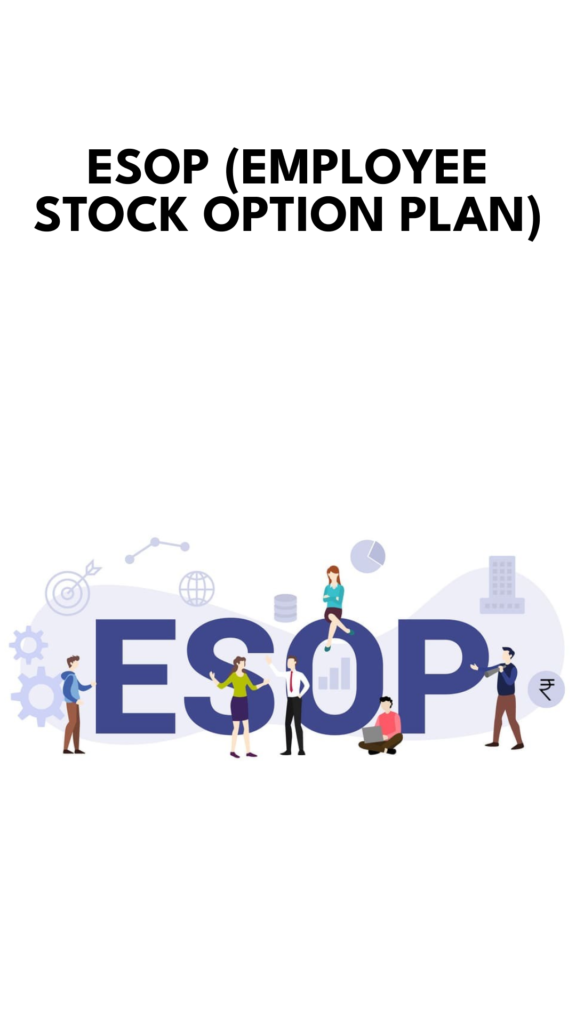An Employee Stock Option Plan for short “ESOP” gives employees the right to buy shares of company in the future at a predetermined price. This price is lower than the price at which stocks of the company are listed on the day of its issuance. This helps the employees generate huge profits. A famous example of successful Employee Stock Option Plan (ESOP) is Zomato – with 18 of its employees turning into millionaires. Thus, it is an innovative way to motivate, reward, remunerate and retain the employees as assets for the company.
Today, most of the companies, including start-ups, offer ESOP to their employees by deducting a small amount of their salaries. If the company gets listed or is already listed, then employees can exercise their right to buy the shares of these companies. It become beneficial if the value of the company’s stocks goes higher.

Table of Contents
Relevant Legislations on Employee Stock Option Plan
Relevant legislations that apply to Employee Stock Option Plan (ESOP) are:
• The Companies Act, 2013
• The Companies (Share Capital and Debentures) Rules, 2014
Section 2(37) of the Companies Act, 2013 defines employee stock option as:
“The option given to the directors, employees or officers of the company or of its holding or subsidiary company, the right to subscribe for the shares of the company at a predetermined price on a future date.”
These schemes are issued when equity shares of the company are listed on a recognised stock exchange in accordance with the regulations made by the Securities and Exchange Board of India (SEBI).
Eligibility for Employee Stock Option Plan
Usually, this right is given to employees who are, in the opinion of the company, assets and worth retaining. The Companies (Share Capital and Debentures) Rules, 2014 states that ESOP can be issued to:
• a permanent employee of the company who has been working in India or outside India; or
• the director of the company including a whole-time director but not an independent director; or
• a permanent employee or a director of a subsidiary company in India or outside India or of a holding company.
Persons excluded from this scheme:
• an employee who is a promoter or a person belonging to the promoter group; or
• a director who either himself or through his relative or through any body corporate holds more than 10% of the outstanding equity shares of the company, whether directly or indirectly.
These exceptions are not applicable to start-ups for a period of 5 years from the date of their incorporation.
What are the compliance requirements in issuing ESOP?
First step
Firstly, the shareholders of the company must approve the issuing of Employee Stock Option Plan (ESOP) scheme through a special resolution. Then, as per Rule 12(2) of The Companies (Share Capital and Debentures) Rules, 2014, the company shall make the following disclosures in the explanatory statement annexed to the notice for passing of the resolution—
(a) total number of stock options to be granted;
(b) identification of classes of employees entitled to participate in the Employee Stock Option Scheme;
(c) the appraisal process for determining the eligibility of employees to the Employee Stock Option Scheme;
(d) the requirements of vesting and period of vesting; (Vesting means the process by which employees become entitled to receive the shares of the company under ESOP and Vesting Period is the period after which employees can exercise the option granted to them under ESOP.)
(e) the maximum period within which the options shall vest;
(f) the exercise price or the formula for arriving at the same; (Exercise is the process of acquiring shares of the company by employees in exchange of option granted to them.)
(g) the exercise period and process of exercise; (Exercise period is the period within which the employee must exercise his right to apply)
(h) the Lock-in period, if any;
(i) maximum number of options to be granted per employee and in aggregate;
(j) the method which the company shall use to value its options;
(k) the conditions under which option vested in employees may lapse e.g., in case of termination of employment for misconduct;
(l) the specified time period within which the employee shall exercise the vested options in the event of a proposed termination of employment or resignation of employee; and
(m) a statement to the effect that the company shall comply with the applicable accounting standard.
Second step
Then, the Board of directors shall disclose in the Directors’ Report for the year, the details of the Employee Stock Option Scheme such as options granted, options vested, options exercised, the total number of shares arising as a result of exercise of option, options lapsed, the exercise price, variation of terms of options, money realised by exercise of options, total number of options in force, etc. as per Rule 12 (9).
The company is also required to maintain a Register of Employee Stock Options and the particulars of option granted shall be entered therein. This Register is maintained at the registered office of the company or such other place as decided by the Board. Additionally, the entries in the register are authenticated by the Company Secretary or by any other person authorised by the Board for the purpose.
Tax Implications of ESOP on Employees
On ESOP, taxes are levied twice:
First Instance
When the vesting period is complete and the employee exercises his option. It is classified as income from salary.
The employee pays tax on difference on the market value of the shares as on the date of transfer of shares and the price at which the employee bought the shares.
For example, an employee received shares at the rate of Rs. 10 a lot of 200 shares. The market value is Rs. 20. Thus, she would pay a tax on Rs. 2000. (i.e. [(200*20= 4000) – (2000*10=2000)]. In this case, the employer deducts tax at source.
Second Instance
When the employee opts to sell the allotted shares under the ESOP. It is classified as Income from Capital Gains.
When the employee sell the shares: Profit received on selling of those shares is taxed under the head of “Income from Capital Gains”.
In case shares are traded, the long-term capital gains is taxed under section 112A at 10 per cent over Rs. 1 lakh of capital gain. Similarly, if it is short-term capital gains, then the same is taxed at a flat rate of 15% under Section 111A of the Act.
FAQs on Employee Stock Option Plan (ESOP)
Is it mandatory to accept ESOPs?
No, it is not mandatory to accept or exercise the given option. It is employee’s discretion to either exercise or let the options lapse if the current prices of shares are lower than the exercise price. In any case, the employee is given a definite time period to opt for or forego his rights. Also, the amount, if any, payable by the employees, at the time of grant of option may be forfeited by the company if the option is not exercised by the employees within the exercise period.
Do employees get a voting right since they now own stocks of company and thus form a part of shareholders?
As per Rule 12 of the Company (Share Capital and debenture) Rules, 2014:
Employees have no right to receive any dividend or to vote or in any manner or enjoy the benefits of a shareholder in respect of option granted to them, till shares are issued on the exercise of option.
Is ESOP transferable?
No, the option granted to employees shall not be transferable to any other person. No person other than the employee to whom the option is granted is entitled to exercise the option.
• If employee dies in employment, all options vest in legal heirs or nominees of the employee.
• If employee suffers a permanent incapacity while in employment. All the options granted to him as on the date of permanent incapacitation, shall vest in him on that day.
• If employee resigns or terminates employment, all options not vested in the employee as on that day shall expire. However, the employee can exercise the options granted to him which are vested within the period specified in this behalf, subject to the terms and conditions under the scheme granting such options as approved by the Board.
Join the LLA telegram group for frequent updates and documents.
Download the telegram group and search ‘Labour Law Advisor’ or follow the link – t.me/JoinLLA
It’s FREE!



